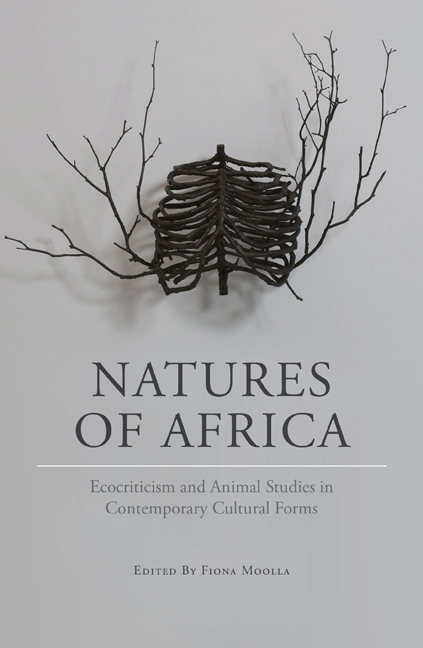Book contents
- Frontmatter
- Table of Contents
- Foreword
- Introduction
- 1 ‘Here is Some Baobab Leaf!’: Sunjata, Foodways and Biopiracy
- 2 Shona as a Land-Based Nature-Culture: A Study of the (Re)Construction of Shona Land Mythology in Popular Songs
- 3 The Environment as Significant Other: The Green Nature of Shona Indigenous Religion
- 4 Animal Oral Praise Poetry and the Samburu Desire to Survive
- 5 The Paradoxes of Voluntourism: Strategic Visual Tropes of the Natural on South African Voluntourism Websites
- 6 Towards an Ecocriticism in Africa: Literary Aesthetics in African Environmental Literature
- 7 Critical Intersections: Ecocriticism, Globalised Cities and African Narrative, with a Focus on K. Sello Duiker's Thirteen Cents
- 8 Navigating Gariep Country: Writing Nature-Culture in Borderline by William Dicey
- 9 Negotiating Identity in a Vanishing Geography: Home, Environment and Displacement in Helon Habila's Oil on Water
- 10 Human Masks? Animal Narrators in Patrice Nganang's Dog Days: An Animal Chronicle and Alain Mabanckou's Memoirs of a Porcupine
- 11 Nature, Animism and Humanity in Anglophone Nigerian Poetry
- 12 Animals, Nostalgia and Zimbabwe's Rural Landscape in the Poetry of Chenjerai Hove and Musaemura Zimunya
- About the authors
- Acknowledgements
- Notes
- Index
7 - Critical Intersections: Ecocriticism, Globalised Cities and African Narrative, with a Focus on K. Sello Duiker's Thirteen Cents
Published online by Cambridge University Press: 10 May 2018
- Frontmatter
- Table of Contents
- Foreword
- Introduction
- 1 ‘Here is Some Baobab Leaf!’: Sunjata, Foodways and Biopiracy
- 2 Shona as a Land-Based Nature-Culture: A Study of the (Re)Construction of Shona Land Mythology in Popular Songs
- 3 The Environment as Significant Other: The Green Nature of Shona Indigenous Religion
- 4 Animal Oral Praise Poetry and the Samburu Desire to Survive
- 5 The Paradoxes of Voluntourism: Strategic Visual Tropes of the Natural on South African Voluntourism Websites
- 6 Towards an Ecocriticism in Africa: Literary Aesthetics in African Environmental Literature
- 7 Critical Intersections: Ecocriticism, Globalised Cities and African Narrative, with a Focus on K. Sello Duiker's Thirteen Cents
- 8 Navigating Gariep Country: Writing Nature-Culture in Borderline by William Dicey
- 9 Negotiating Identity in a Vanishing Geography: Home, Environment and Displacement in Helon Habila's Oil on Water
- 10 Human Masks? Animal Narrators in Patrice Nganang's Dog Days: An Animal Chronicle and Alain Mabanckou's Memoirs of a Porcupine
- 11 Nature, Animism and Humanity in Anglophone Nigerian Poetry
- 12 Animals, Nostalgia and Zimbabwe's Rural Landscape in the Poetry of Chenjerai Hove and Musaemura Zimunya
- About the authors
- Acknowledgements
- Notes
- Index
Summary
I begin by stating the obvious: those of us who read and write in universities, who research and publish, live lives shaped by modern cities. Whether we live in large cities, in towns of various sizes – or in landscapes that are truly rural – we exist within transportation, communication and resource-distribution networks that rely on an array of urban institutions and their sustaining technologies (though these networks may vary from region to region in how smoothly they operate). Moreover, we make sense of the world by drawing on cultures that bear the imprint of the thinking that humans have required if they are to negotiate and reproduce modern cities successfully. Just as importantly, the actuality of urban existence, its material processes, in addition to its cultures, have formed the subjectivity from which our thinking, moment by moment, emerges. Cities, in this sense, represent a normal and obvious fact of our lives, no matter how upsetting or disturbing we may find our particular urban places, which we negotiate as we earn a living, build personal relationships and seek what gratifies us.
The question motivating this chapter begins to address this complex actuality for us as disciplined readers of literature alert to global environmental concerns: how do we read in a way that acknowledges simultaneously our modern urban realities and the fact that failure to grasp human life in relation to natural worlds can lead to damaging consequences – for both humans and the life forms they encounter? This question becomes especially urgent in an era in which we, as a species, need both to adapt to – and, if possible, to mitigate – the effects of climate change. The question, so daunting to face, raises such a wide range of issues that this chapter can take only the smallest steps to address it. And, because ecocriticism with an urban focus has yet to develop, I am as much concerned with method as with conclusions.
As this chapter illustrates, I envision an ecocriticism that joins in multidisciplinary conversation about environmental futures, contributing literary studies’ special insights into language and its crafting.
- Type
- Chapter
- Information
- Natures of AfricaEcocriticism and Animal Studies in Contemporary Cultural Forms, pp. 166 - 186Publisher: Wits University PressPrint publication year: 2016



